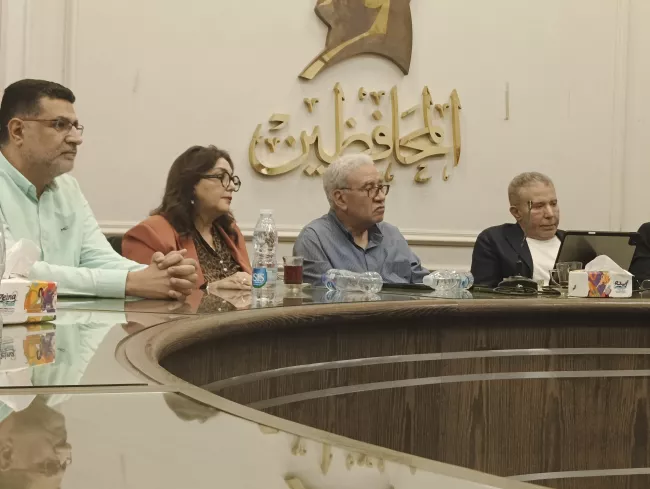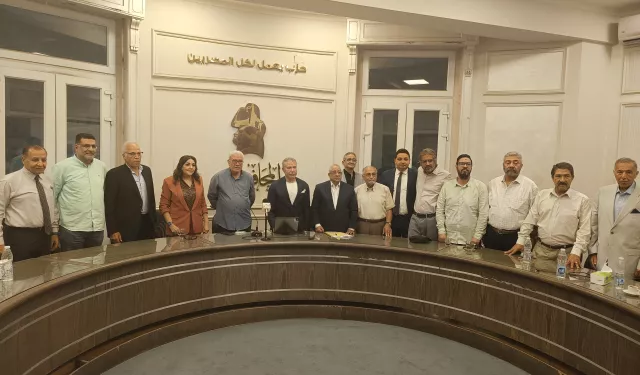Egypt’s Civil Democratic Movement deferred its position on the upcoming parliamentary elections during a press conference Sunday, sparking criticism of opposition stagnation while reaffirming its refusal to align with pro-government parties.
The coalition of liberal and leftist parties gathered at the Conservative Party’s downtown headquarters to clarify its electoral stance after recent legislative amendments, including redistricting and modest adjustments to the House of Representatives and Senate election laws. But leaders ended the event without announcing a decision, citing the need for further internal consultation. However, there was no hint of a boycott.
Speakers, all leaders of member parties denounced the current law, which blends individual candidacies with a closed-list system that grants all seats to winning slates. They dismissed it as unconstitutional, accusing it of undermining political pluralism and stifling competition. Participants also affirmed the Civil Movement’s genuine interest in contesting the parliamentary elections.
The amendments, which included limited changes in the division of individual and closed-list districts amid rising numbers of registered voters, were made in accordance with Article 102 of the constitution, which mandates fair representation based on population. However, they did not include any increase in the number of House or Senate members.
The proposal also did not address the electoral system for party lists, which was a point of contention between the opposition and pro-government representatives during the National Dialogue two years ago.

The Civil Democratic Movement’s conference at the Conservative Party headquarters on SundayOne-horse elections
Conservative Party leader Akmal Kortam said the election laws passed by parliament “violate constitutional principles,” which affirm that Egypt’s political system is based on pluralism. He argued that the combination of individual candidacies and closed lists “leaves no room for political competition and paves the way for a one-horse race,” accusing the government of lacking interest in a transition to a modern civil state.
El-Dostour Party leader Gameela Ismail described the new electoral framework as “another missed opportunity to escape the bottleneck” after hopes raised by the now-concluded National Dialogue.
“Reenacting the same scene will only cement the status quo,” she said. “For those in power, pluralism has become a game of musical chairs played every five years. Only the lucky get a seat, thanks to those in charge.”
The National Dialogue sessions concluded earlier this year with a recommendation to adopt a balanced system combining the proportional list method, which the opposition has long advocated, with the closed-list system currently in place, which allows a list winning 50%+1 of votes to claim all the seats without any representation for other lists, a model the pro-government bloc insists on preserving.
No Boycott
During the conference, the Civil Movement reaffirmed its longstanding position against entering electoral alliances led by pro-government parties. This stance, voiced by Salah Adly, general secretary of the Egyptian Communist Party, is consistent with the Movement’s refusal to join similar coalitions during the 2020 elections. At the same time, Adly ruled out boycotting the elections, saying: “We are not proponents of severing ties; we are studying all available options.”
The Movement is also preparing a legal challenge against the current law. Magdy Hamdan, a senior figure in the Conservative Party, announced his intent to file a constitutional appeal. “The amendments passed by parliament ignore fair representation for voters and population blocs,” he said. “According to 2023 data from the Central Agency for Public Mobilization and Statistics, Badrashin and Al-Ayyat—with 553,505 residents—have been allocated three seats, while Warraq, Manshiyat al-Qanater, and Awsim—with 889,106 residents—get four seats. Meanwhile, Imbaba and Giza’s Mounira West, with 1,045,248 people, have only two seats.”
The conference also witnessed debate over the opposition’s electoral readiness and its failure to adapt despite clear indications that the 2015 electoral system would remain unchanged. While some party representatives blamed the state for excluding the opposition and subjecting its parties to political, media, and security restrictions, others acknowledged the opposition’s sluggish response and internal weaknesses.
“The opposition is being criticized by everyone,” said Akram Ismail, a leader with the under-formation Bread and Freedom Party. “But we have faced a prolonged political lockdown and systematic exclusion that limit our capacity to operate and expand. We participated in the National Dialogue and offered alternatives. The state’s response was that the next parliament should be homogeneous.”
Dr Mostafa Kamel El Said, a Civil Movement board member and former deputy coordinator of the National Dialogue’s political track, said the opposition offered credible alternatives during the discussions. However, the authorities insisted on keeping the current system. El Said stated that the Movement proposed replacing the closed-list system with proportional representation alongside individual contests, offering a formula of 50% individual, 25% proportional, and 25% closed lists to ensure constitutionality and inclusiveness. “The decision-maker had alternatives, but chose the system that wastes votes and kills competition,” he said.
Responding to questions from journalists about the opposition’s delay, Kortam said, “The electoral system didn’t surprise us. We anticipated this. It’s good that the number of parliamentary seats wasn’t increased.” He added that the Movement believes it has a chance at parliamentary representation through independent lists.
Speaking to Al Manassa after the conference, Kortam said the Movement is now considering running in all four electoral districts and backing select candidates in individual contests. He stressed the Movement’s capacity to form robust, competitive lists.
“Running via lists is preferable if a fair electoral climate is secured,” he said. “Individual contests depend too much on candidate popularity and financial resources, while lists reflect clear political choices.”
He expressed hope that the president would reject the electoral law amendments in light of the region’s current instability.
In a statement issued a few days earlier, the Civil Movement said that “the insistence on applying a system that wastes voters’ voices and denies them the right to representation, along with the redistricting process that reinforces a monopoly-based philosophy, confirms that the electoral process is entirely managed by state agencies.”
The House of Representatives consists of 596 seats, of which 28 are appointed by the president. The remaining seats are evenly split between individual candidacies and closed-list contests. The Senate has 300 members: one-third appointed by the president, one-third elected via individual candidacies, and one-third through closed-list contests.
